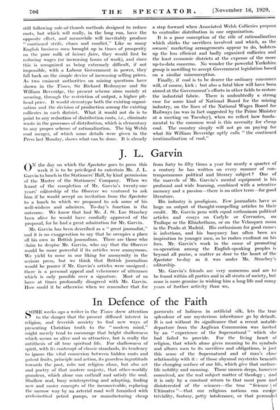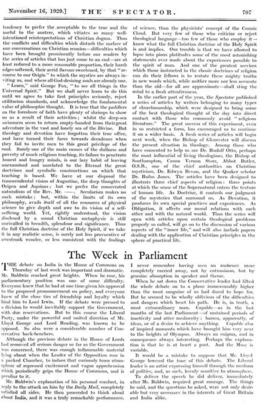In Defence of the Faith
OME weeks ago a writer in the Times drew attention S to the danger that the present diffused interest in religion, and feverish anxiety to find new ways of presenting Christian truth to the " modern mind," might merely tend to encourage that bright shallowness which seems so alive and so attractive, but is really the antithesis of all true spiritual life. For shallowness of spirit, with its contempt of classic standards, its tendency to ignore the vital connexion between hidden roots and patent fruits, principle and action, its graceless ingratitude towards the past, robs not religion alone, but also art and poetry of that austere majesty, that other-worldly grandeur, which alone can enthrall and satisfy the soul. Shallow zeal, busy reinterpreting and adapting, finding new and easier concepts of the inconceivable, replacing the narrow way by an arterial road well .furnished with ecclesiastical petrol pumps, or manufacturing cheap garments of holiness in artificial silk, lets the true splendour of our mysterious inheritance go by default. It is not without its significance that a recent notable departure from the Anglican Communion was inoited by an " experience of the Supernatural " which 'she had failed to provide. For the living heart of religion, that which alone gives meaning to its symbols and allures men to its sacrifices and obligations, is just this sense of the Supernatural and of man's elkose relationship with it : of those abysmal mysteries beneath the changing surface of our life, which give that surfeice- life nobility and meaning. Those unseen deeps, however conceived, are the real Subject matter of theology ; and it is only by a constant return to that most pure kind disinterested of the sciences—the true "Science of Ultimates "—that our religious notions can es pc triviality, fantasy, petty intolerance, or that perenn 1 tendency to prefer the .acceptable to the true 'and the useful to the austere, which vitiates so many well- intentioned reinterpretations of Christian dogma. Thus the conflicts and difficulties which disturb the surface of our conversations on Christian reunion—difficulties which have been brought prominently before our readers by the series of articles that has just come to an end—are at least reduced to a more reasonable proportion, their harsh edges softened, their acrid flavour sweetened, by that " re- course to our Origin " to which the mystics are always in- viting us, and where all God-desiring souls are already one.
" Learn," said George Fox, " to see all things in the Universal Spirit." But we shall never learn to do this until we agree to take first principles seriously, reject utilitarian standards, and acknowledge the fundamental value of philosophic thought. It is true that the paddlers on the foreshore of faith have plenty of shrimps to show us as a result of their activities ; whilst the deep-sea swimmers seem to return empty-handed from their great adventure in the vast and lonely sea of the Divine. But theology and devotion have forgotten their true office, and have turned their faces towards decadence when they fail to invite men to this great privilege of the soul. Surely one of the main causes of the dullness and poverty of much religious teaching, its failure to penetrate honest and hungry minds, is our lazy habit of leaving unexamined and unrelated to the Eternal the great doctrines and symbolic constructions on which that teaching is based. We have at our disposal the transcendental vision of Augustine, the deep thoughts of Origen and Aquinas ; but we prefer the consecrated naturalism of the Rev. Mr. —. Secularism makes no such mistake ; but, within the limits of its own philosophy, avails itself of all the resources of physical science to give depth and awe to its vision of a self- sufficing world. Yet, rightly understood, the vision disclosed by a sound Christian metaphysic is still unrivalled in breadth, splendour and significance. Thus the full Christian doctrine of the Holy Spirit, if we take it in any realistic sense, is surely not less provocative of awestruck wonder, or less consistent with the findings of science, than the physicists' concept of the Cosmic Cloud. But very few .of those who criticize or reject theological language—too few of those who employ it— know what the full Christian doctrine of the Holy Spirit is and implies. Our trouble is that we have allowed to lapse into pious platitudes some of the most astonishing statements ever made about the experiences possible to the spirit of man. And one of the greatest services which those instructed in the classic doctrines of religion can do their fellows is to restate these mighty truths in new words which, while neither more nor less accurate than the old—for all are approximate—shall sting the mind to a fresh attentiveness.
In the earlier part of the year, the Spectator published a series of articles by writers belonging to many types of churchmanship, which were designed to bring some of the best theological thought of the day into direct contact with those who commonly avoid " religious literature." The great success of this experiment, even in so restricted a form, has encouraged us to continue it on a wider basis. A fresh series of articles will begin next week, when the Bishop of Gloucester will discuss the present situation in theology. Among those who have consented to help us arc Dr. Rudolf Otto, perhaps the most influential of living theologians, the Bishop of Southampton, Canon Vernon Storr, Abbot Butler, O.S.B., one of the chief authorities on Christian mysticism, Dr. Edwyn Bevan, and the Quaker scholar Dr. Rufus Jones. The articles have been designed to illustrate three chief aspects of religion : three points at which the sense of the Supernatural enters the texture of human life. As Doctrine, it controls our judgment of the mysteries that surround us. As Devotion, it produces its own special practices and experiences. As Obligation, it affects our moral relations with each other and with the natural world. Thus the series will open with articles upon certain theological problems properly so called, will go on to the discussion of various aspects of the "inner life," and will also include papers dealing with the application of Christian principles in the sphere of practical life.









































 Previous page
Previous page